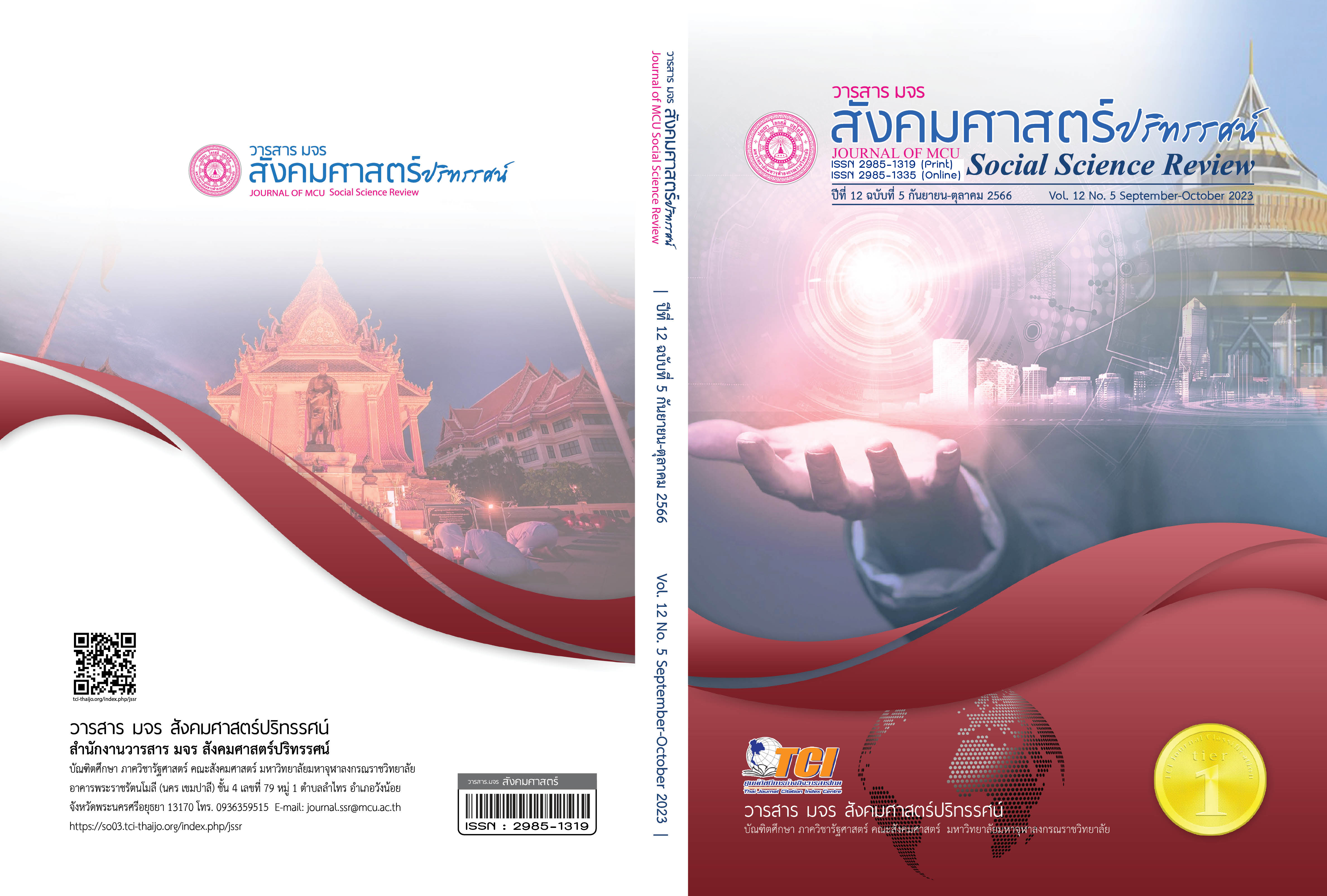พุทธธรรมเพื่อพัฒนาทุนมนุษย์ในยุคของการเปลี่ยนแปลง
คำสำคัญ:
พุทธธรรม, ทุนมนุษย์, การเปลี่ยนแปลงบทคัดย่อ
บทความนี้เป็นการศึกษาหลักพุทธธรรมในการพัฒนาทุนมนุษย์ในยุคของการเปลี่ยนแปลงทั้งนี้เนื่องจากทุนมนุษย์ เป็นฐานรากของการพัฒนา และขับเคลื่อนสิ่งต่าง ๆ ในสังคม โดยใช้กำลังกายและกำลังสมองที่มีอยู่ในตัวมนุษย์ ก่อให้เกิดการพัฒนาที่เป็นประโยชน์ต่อมวลมนุษยชาติ แต่อย่างไรก็ตาม ความทันสมัยของเทคโนโลยี ส่งผลให้โลกอยู่ในยุคของการเปลี่ยนแปลงซึ่งมีผลกระทบต่อทุนมนุษย์ ได้แก่ 1) ด้านกายภาพ ทำให้มนุษย์มีสุขภาพทรุดโทรมจากภาวะโรคต่าง ๆ 2) ด้านสังคม ทำให้เกิดปฏิสัมพันธ์ของมนุษย์ในสังคมลดลง 3) ด้านจิตใจ ทำให้มนุษย์ไม่สามารถควบคุมและรู้เท่าทันจิตของตนได้ และ 4) ด้านปัญญา ทำให้มนุษย์ใช้ปัญญาในทางที่ไม่เหมาะสม เป็นต้น ดังนั้น 1) ครอบครัว ชุมชน และสังคม ควรมีหน้าที่ในการปลูกฝังค่านิยมและทัศนคติที่ดีงามให้แก่ทุนมนุษย์ และ 2) ภาครัฐ ควรจัดให้มีการปฏิรูปการเรียนรู้ เพื่อพัฒนาทุนมนุษย์ให้เป็นคนเก่ง เป็นคนดี มีศีลธรรม และที่สำคัญควรนำหลักพุทธธรรมภาวนา 4 มาปรับใช้ในการพัฒนาทุนมนุษย์สู่เป้าหมายการพัฒนาที่ยั่งยืน ประกอบไปด้วย 1) กายภาวนา หมายถึง พัฒนาให้เป็นผู้ที่มีสุขภาพร่างกายแข็งแรง 2) สีลภาวนา หมายถึง พัฒนาให้เป็นผู้ที่มีความประพฤติที่ดีงาม และมีคุณธรรม จริยธรรม อยู่ร่วมกันอย่างสงบสุขด้วยศีล 3) จิตภาวนา หมายถึง พัฒนาให้เป็นผู้ที่มีจิตใจมั่นคง เข้มแข็ง และ 4) ปัญญาภาวนา หมายถึง พัฒนาให้เป็นผู้ที่มีความรู้ ความสามารถเท่าทันสถานการณ์ต่าง ๆ ด้านการศึกษาและศาสนา
เอกสารอ้างอิง
กรมควบคุมโรค กระทรวงสาธารณสุข. (2564). โรคติดเชื้อไวรัสโคโรนา 2019 (COVID-19). สืบค้น 6 ตุลาคม. 2564, จาก https://ddc.moph.go.th
กรมสุขภาพจิต. (2564). รายงานอัตราการฆ่าตัวตายสำเร็จต่อประชากรแสนคน. สืบค้น 6 ตุลาคม 2564, จาก https://www.dmh.go.th/report/suicide
กองยุทธศาสตร์และแผนงาน สำนักงานปลัดกระทรวงสาธารณสุข. (2563). สถิติสาธารณสุข 2562. นนทบุรี: กระทรวงสาธารณสุข.
กัญญภัค แมกกี้. (2553). ปัญญาในพุทธเถรวาท. วารสารปรัชญาปริทรรศน์, 23(1), 114-123.
กันยารัตน์ จันทร์สว่าง (2563), ทุนมนุษย์ : กุญแจเพื่อพัฒนาชาติของสิงคโปร์. วารสารมนุษยศาสตร์และสังคมศาสตร์ มหาวิทยาลัยราชภัฏสุราษฎร์ธานี, 12(1), 329-349.
กิตติภูมิ วิเศษศักดิ์. (2552). การพัฒนาทุนมนุษย์ในการปรับเปลี่ยนไปสู่องค์กรสมัยใหม่หรือ องค์กรสมรรถนะสูง. ปทุมธานี: มหาวิทยาลัยธรรมศาสตร์.
เกรียงไกรยศ พันธุ์ไทย. (2552). กลยุทธ์การพัฒนาทรัพยากรมนุษย์เชิงบูรณาการ : กุญแจสู่ความเป็นเลิศ. กรุงเทพฯ: สถาบันบัณฑิตพัฒนบริหารศาสตร์.
จิรประภา อัครบวร. (2552). คุณค่าคนคุณค่างาน. กรุงเทพฯ: สำนักพิมพ์เต๋า.
ดนัย เทียนพุฒ. (2553). ทุนมนุษย์จัดการให้ดีสู่ดีเลิศ. กรุงเทพฯ: โครงการฮิวแมน แคปปิตอล.
ไทยโพสต์. (2564). ความเอื้ออาทรของคนไทย ณ วันนี้. สืบค้น 6 ตุลาคม 2564, จากhttps://www. thaipost.net/main/detail/80945
ธำรงศักดิ์ คงคาสวัสดิ์. (2550). ทุนมนุษย์การกำหนดตัวชี้วัดเพื่อพัฒนา. กรุงเทพฯ: สมาคมส่งเสริมเทคโนโลยี (ญี่ปุ่น-ไทย).
นิสดารก์ เวชยานนท์. (2551). มิติใหม่ในการบริหารทุนมนุษย์. กรุงเทพฯ: บริษัท กราฟิโก ซิสเต็มส์ จํากัด.
พระธรรมปิฎก (ป.อ. ปยุตฺโต). (2559). พจนานุกรมพุทธศาสตร์ ฉบับประมวลธรรม (พิมพ์ครั้งที่ 39) พ.ศ. 2559. กรุงเทพฯ: มูลนิธิการศึกษาเพื่อสันติภาพ.
วรารัตน์ เขียวไพรี. (2551). การพัฒนาทรัพยากรมนุษย์ในองค์การ. กรุงเทพฯ: มหาวิทยาลัย ราชภัฏธนบุรี.
Mondy, R. W. & Noe, R. M. ( 2005). Human Resource Management. Upper Saddle River, NJ: Prentice- Hall.
Nadter, L. & Nadler, Z. (1989), Developing Human Resource. San Francisco: Jossey- Bass.
Rurkkhum, R. (2014). Human Resource Development: Principles and Applications (2nd ed.) Bangkok: Chulalongkorn University Press.
ดาวน์โหลด
เผยแพร่แล้ว
รูปแบบการอ้างอิง
ฉบับ
ประเภทบทความ
สัญญาอนุญาต
ลิขสิทธิ์ (c) 2023 วารสาร มจร สังคมศาสตร์ปริทรรศน์

อนุญาตภายใต้เงื่อนไข Creative Commons Attribution-NonCommercial-NoDerivatives 4.0 International License.
เพื่อให้เป็นไปตามกฎหมายลิขสิทธิ์ ผู้นิพนธ์ทุกท่านต้องลงลายมือชื่อในแบบฟอร์มใบมอบลิขสิทธิ์บทความให้แก่วารสารฯ พร้อมกับบทความต้นฉบับที่ได้แก้ไขครั้งสุดท้าย นอกจากนี้ ผู้นิพนธ์ทุกท่านต้องยืนยันว่าบทความต้นฉบับที่ส่งมาตีพิมพ์นั้น ได้ส่งมาตีพิมพ์เฉพาะในวารสาร มจร สังคมศาสตร์ปริทรรศน์ เพียงแห่งเดียวเท่านั้น หากมีการใช้ภาพหรือตารางหรือเนื้อหาอื่นๆ ของผู้นิพนธ์อื่นที่ปรากฏในสิ่งตีพิมพ์อื่นมาแล้ว ผู้นิพนธ์ต้องขออนุญาตเจ้าของลิขสิทธิ์ก่อน พร้อมทั้งแสดงหนังสือที่ได้รับการยินยอมต่อบรรณาธิการ ก่อนที่บทความจะได้รับการตีพิมพ์ หากไม่เป็นไปตามข้อกำหนดเบื้องต้น ทางวารสารจะถอดบทความของท่านออกโดยไม่มีข้อยกเว้นใดๆ ทั้งสิ้น





